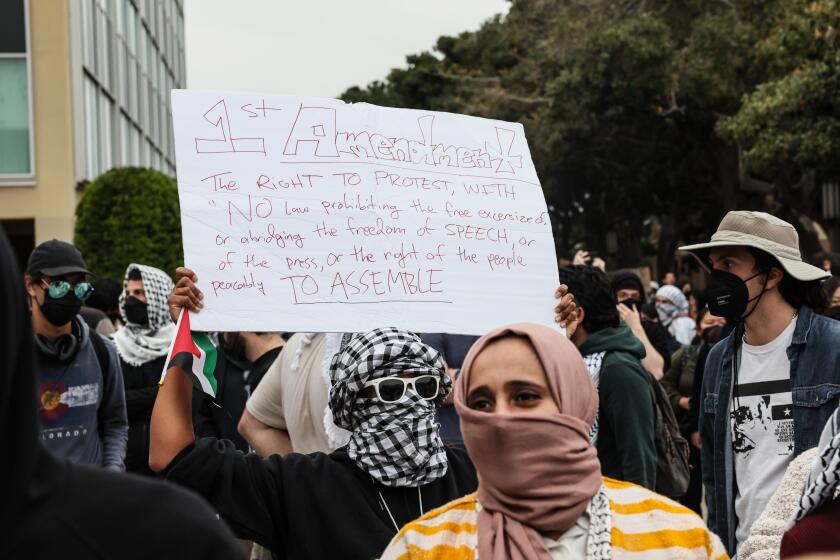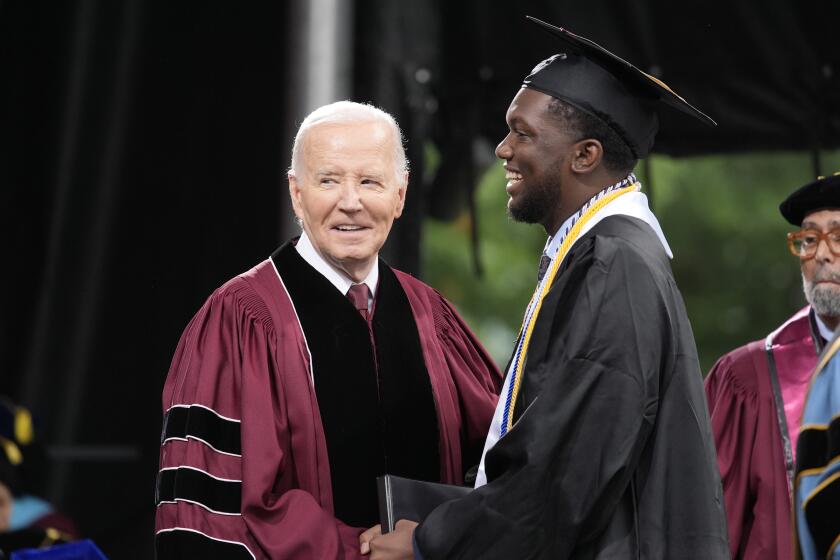New Age Parents Face Child-Rearing Dilemmas : Education: Deciding how--or whether--to pass along spiritual beliefs can be hard for those outside mainstream.
After two decades of shopping in California’s spiritual supermarket, Brian and Joyce Lyke have finally found it.
Joyce, the granddaughter of a Southern Baptist preacher, is studying under a Sufi mystic in Berkeley. Her husband, a former Presbyterian minister, laughingly calls himself an evangelical Taoist.
Brian stops laughing when asked what religion he is passing on to his children. Although this California couple has deep Protestant roots, neither Karina, 14, nor Brendon, 9, has been baptized.
Like countless other couples from the baby boom generation, the Lykes are wondering what--if anything--they should do about the religious upbringing of their children. For parents involved in the New Age movement, or those in spiritual groups outside the Judeo-Christian mainstream, such decisions can be particularly troublesome.
“The real dilemma comes when I think about the kids,” said Brian, sitting in the family room of his Carmel home. “I can’t really say at this point that I’m a Buddhist or a Christian or that I’m anything. I’m . . . undefined.
“That’s OK with me, because I see my understanding deepening. But I don’t know about the kids. I’m not indoctrinating them in anything, really. We don’t go to church.”
Many of those questioned in a San Francisco Chronicle/Religious News Service survey of members of new religious movements say they are exposing their children to a variety of belief systems--or none at all--hoping they would make up their own minds.
“There has been a real baby boom among pagans. A lot of people are having children,” said Starhawk, a popular author and lecturer who describes her identity as Jewish and her religion as pagan.
Born to Jewish parents as Miriam Simos, Starhawk lives in a collective home in San Francisco that includes four stepchildren. She worships with a neo-pagan church called Covenant of the Goddess.
“Pagans are naturally eclectic. We combine traditions easily,” Starhawk said. “We celebrate the winter solstice, but we also light the menorah, celebrate Kwanzaa and put up a yule tree in our house. It’s pretty busy here around Christmas.”
Michael Wenger, president of the San Francisco Zen Center, which runs three Buddhist meditation and retreat centers in Northern California, said many Buddhists are struggling with the religious education of their children.
One Saturday a month, the first 10 minutes of the weekly lecture at the Zen Center is directed toward the children, who then leave to have tea and listen to children’s stories.
“Many of us are edgy about whether or not we should show our kids what we do,” said Wenger, the father of a 5-year-old. “Zen Center still has a lot of members who came of age in the 1960s when there was uneasiness with religious education.
“Eventually, there’s no choice. Either you cut your children out of your life or you include them. But you don’t have to hit them over the head with your religion.”
Other couples, such as the Lykes, are struggling to find their own way to instill spiritual values in their children. The problem is that their religion, what Joyce calls her “inner kind of church,” is so personalized that they have trouble finding ways to include their own children in it.
“We haven’t exposed our kids to the traditional church,” Joyce said, “but I feel like we have exposed them to some kind of spiritual life in the way we have lived our own life. I practice meditation daily, and they see that.”
“But that is definitely a weakness about this spiritual work I am doing now. Families are not part of it. It’s not organized like the Presbyterian Church, where there is a Bible school for the kids.”
At Carmel High School, where Karina goes to school, some of her friends are starting to experiment with LSD and purportedly hallucinogenic psilocybin mushrooms.
Her parents see psychedelic drugs as a key to their own spiritual awakening and cannot see themselves advising their daughter to “just say no.”
“I think it might be all right if it was done as some sort of rite of passage, in a controlled setting and a safe environment,” Brian Lyke said.
“Native societies do this to bring their kids into the realms of the mysteries. Why shouldn’t we?”
Lyke’s question cuts to the heart of his generation’s search for meaning, ritual and tradition. Having rejected their religious heritage, the Lykes are afloat in a sea of unlimited spiritual possibilities.
What they will not do, however, is force their Christian heritage on their children.
“I don’t want to indoctrinate my kids into something I have already shed, something I have let go of,” Brian Lyke said. “My religious training was very dry and rational. I want my kids to know there is more to it than that.”



